- Home
- Mark Chadbourn
Jack of Ravens kots-1 Page 10
Jack of Ravens kots-1 Read online
Page 10
‘You must not set your hopes too high,’ Jerzy cautioned.
‘I’ve got no choice. I have to talk to Niamh.’
It was near midnight, and the palace slept. As Church and a reluctant Jerzy trailed along the echoing corridors, guards stood silently, their numbers increasing the closer they came to the royal apartments. Their eyes fell on Church, but he was not a threat to be challenged. He had the run of the place like a favoured poodle. Sit up. Beg. Play dead. Defiantly, Church increased his pace.
As he neared Niamh’s door, the air grew colder and soon he could see sparkles of frost on the stone. Jerzy indicated with an uncertain finger the guard who stood outside. His skin gleamed white, his eyebrows and hair rigid with frost.
‘Frozen,’ Jerzy whispered. ‘Do not enter, friend Church,’ Jerzy pressed. ‘Leave what lies beyond these doors to the Golden Ones.’
Despite his apprehension, Church was eager for answers. He marched in. Ice shimmered on the floor, walls and ceilings. The bodies of Niamh’s inner guard were scattered in an arc near the door, ribs protruding like dinosaur teeth, slippery organs trailing. A slaughter, quick and brutal. Church wondered briefly what could have the power to dispatch these beings before his attention was caught by a rapid fluttering of golden lights over one of the bodies, then another, and finally over all of them.
They were shimmering moths, composed entirely of light, spiralling up from the bodies to the ceiling and then passing through it like ghosts. As the moths departed, the gods’ bodies began to break up, as though they were as insubstantial as light. When the final moth had fluttered away, all the bodies had vanished.
Church snatched up one of the guards’ short swords and progressed towards the heavy drapes that sealed off Niamh’s bed-chamber. Pulling back the thick fabric, he found Niamh being menaced by the stranger from the market. Church recognised the long, black hair and overcoat, but the face … it was a thing of abject horror. Noting Church’s arrival, the stranger’s lips twisted into a cruel grin revealing needle-sharp animal teeth, stained with blood. Church registered a goatee beard and an aquiline nose, but it was the eyes he would never forget — lidless and fiery red with a small black pupil. When the full force of them was turned on him, Church felt their gaze pierce his very soul.
‘Well, this is something I hadn’t bargained for.’ The attacker crooked his arm tighter around Niamh’s neck, her beautiful features fragile next to his brutal frame. His right hand was raised ready to strike, the fingers pointed to reveal bloody talons.
‘Leave her alone,’ Church said.
‘What’s this? Misplaced loyalty? Or have you already grown into your role of lapdog? Jump through hoops for the mistress. Woof, woof!’
Church bristled at the echo of his own thoughts. ‘She doesn’t deserve to die like those others out there.’
That would be a matter of opinion. I think she does deserve to die. I presented her with a perfectly good opportunity and she chose to turn me down. I find that very disrespectful.’
Jerzy had been watching the scene, wrapped in the drapes. Tentatively, he stepped forward and tugged gently at Church’s arm. His eyes pleaded but he said nothing.
‘Speak up, you grinning buffoon!’ the intruder said. ‘Ah, I see. You don’t want to be seen to be disloyal in case, by some extremely slight probability, your mistress escapes with her life.’ The intruder said to Church in a tired voice, ‘What he’s trying to tell you is that you should let her die because then you will both be free of her control. And that sounds eminently sensible to me.’
‘But even then I’d still be a prisoner,’ Church replied, ‘of my guilt.’ His eyes briefly locked with Niamh’s.
‘You really have been seduced by her propaganda, haven’t you?’ the intruder said wearily. He flexed his fingers and prepared to strike.
‘Who are you and what do you know about Ruth?’
The intruder’s cruel smile grew more enigmatic. ‘Finally, a discussion that really matters. Of course, the first question is the most important. Let’s talk about me. What should you call me? I have many names, and you’ll never discover the one that really counts. But for the sake of argument you may call me the Libertarian, because I believe in personal freedom … from the rigours of choice, from life itself. See? I too can play the favourite game around these parts.’
The Libertarian increased the pressure on Niamh’s neck with a twist of cruelty. She clawed at his arm, her breathing shallow.
‘I said, let her go.’ Church raised his sword.
‘Ooh, a weapon,’ the Libertarian said with mock-dismay. He was unthreatened, but he released the pressure of his arm a little so Niamh could gulp air. Church took a step forward. The Libertarian’s red gaze became so menacing that Church stopped dead in his tracks.
Summoning his strength, Church asked, What about Ruth? Tell me.’
‘Ah, the love of your life, waiting so mournfully at the end of time-’
‘What do you mean?’
‘A word to the wise: her survival is wholly dependent on you. Interfere in any way and she will die.’
‘I don’t understand. Interfere in what?’
The Libertarian made a faux-puzzled expression. ‘Now there’s the question. Perhaps it would be better not to interfere in anything, just to be on the safe side.’
His words triggered a moment of revelation. ‘You … and whoever murdered my friends in Carn Euny … and the spider-thing that controlled the Redcaps — you’re all together in this.’ Church added a disturbing codicil: And Etain, too.’
The Libertarian continued to play his part with studied theatricality. ‘Look at Existence, all nice and shiny and neat and new. Then pull back the surface and, lo, there we are. An army … no, that doesn’t do us justice — a civilisation. We’re all around you, all the time, yet you never see us, not really, not directly. Just an occasional glimpse on the periphery of vision. We live in the cracks between reality. We watch from the shadows, peer from the depths of caves, from drains and sewers, from the dusty windows of empty houses and rooftops at night.’
‘What do you want?’
‘The same as anyone else — food, drink, a roof over our heads.’ His sarcasm hung in the air for a moment. ‘We are everywhere. We are legion. There, a quotation that has not yet been written. Or perhaps it is being written as we speak. Ah, the mysteries of Existence.’ He smiled coldly. ‘We are the flipside of your world, but the flipside does not always have to stay at the bottom.’
Something in the Libertarian’s eyes or tone made Church unaccountably fearful. ‘If you are what you say you are, why are you so concerned about me?’
The Libertarian’s eyes narrowed.
‘It’s the Pendragon Spirit, isn’t it?’
Niamh seized the opportunity to break free from the Libertarian’s grip. She scrabbled across the floor to Church’s side, all her haughtiness gone. ‘The light burns too brightly in you,’ she gasped. ‘They are only brave enough to crush you by subtle means, from a distance.’
‘Some of us can strike directly,’ the Libertarian said, ‘and we will, when the time is right.’
‘He asked me to destroy you, in the night, while you slept,’ Niamh said. ‘I refused. No Golden One would obey such an order.’
‘If you do it, it has to be of your own free will,’ Church noted sardonically.
‘Our power may be limited now, but it grows with each step closer to the Source,’ the Libertarian said, before skipping lithely to the open window. He bowed and dived through it.
Church rushed to the window, hoping the killer had leaped to his death, but he could just make out a dark shape disappearing down the side of the sheer wall. The handholds were few and far between, but somehow the Libertarian found them, moving with remarkable speed.
Church turned to Niamh, clearly still dazed by her experience. ‘Are you okay?’ he asked.
The goddess eyed him as if he were speaking a foreign language. ‘You could have allowed me to be eradica
ted from Existence. You would have been freed from your obligation.’
‘I could. But I wouldn’t have been able to live with myself.’
A flicker of emotion crossed Niamh’s normally impassive features, before she snorted, haughty once more.
‘I saved your life,’ Church said. ‘You can deny it, but it’s true. And if you think your life has some value I’d ask for one small thing in reward.’
7
The journey took ten days, across a mythic landscape of forests that stretched as far as the eye could see, their secret depths dark and cool and mysterious, and sweeping grasslands skirting the edge of mountains that scraped the sky; through verdant, peaceful glens and past mirror-glass lakes where clouds scudded silently.
The landscape almost served to soothe Church’s unease. But at night, as he lay beside the campfire, the deep waters inside him moved with a slow, tidal pull. The Libertarian’s words hinted at a hidden pattern behind the mundane reality of his life, but he could not find the connections that would give him understanding.
Jerzy had been his guide, poring over maps given to him by Niamh’s advisors and studying the sun and the stars. He had been silent for much of the last leg of their journey, but as they rounded the base of a crag above which eagles soared, he said in a troubled voice, ‘The tension makes me queasy. When will the queen make her move?’
‘What do you mean?’
‘Surely you do not expect to reach your destination?’
‘Why not?’
‘It is not the way of the Golden Ones to give a person what they desire. They love their sport. We will wake one morning in the Court of the Soaring Spirit and find the entire journey a dream. Or as you reach out to knock on the door, the Court of Peaceful Days will turn into a stone at the roadside, or an egg in the nest of one of those eagles. Or-’
‘If it’s going to happen, it’s going to happen. But I think Niamh might just allow me this one thing.’
‘Why would she do that? It is not her way.’
‘There was something different about her after the Libertarian left … I don’t know.’
Jerzy shrugged. His fixed grin took the edge off his downcast manner.
Soon after, the Court of Peaceful Days hove into view, a network of interconnecting, long, low stone buildings with a wood growing all around it, and amongst the residences, and in some places within the buildings themselves, sprouting out of the red-tiled roofs. Flags and banners fluttered from many buildings, while emblems were embedded in the walls. A winding path led to the main door, passing through a solitary wrought-iron gate that soared up nearly fifteen feet, topped with spearheads. The gate swung open soundlessly to allow Church and Jerzy through.
Standing outside the main door, they could hear the measured, heavy beat of drums reverberating from somewhere deep within the complex, never slowing or missing a step, like the beat of a giant heart.
Church was afraid the drumming would obscure his knock on the door, but it opened soon after to reveal two rows of guards in shining silver armour, bristling with swords, spears, halberds, axes and maces. Up near the roof beams, two red and purple globes floated around. They appeared solid, but occasionally passed through each other.
At the end of the ranks stood a woman, also in armour. Her silver breastplate caught the sun, momentarily blinding Church. When his vision cleared, he saw she was wearing a helmet that covered both cheeks to her jawline, curving round the orbits of her eyes to protect her nose, so that her eye-sockets were thrown into shadow. Silver hawk-wings rose up on either side, and from the spike on top hung a red ribbon.
‘Welcome,’ she said in a sonorous voice that rang with the same tone as the pounding drum, ‘to the Court of Peaceful Days.’
Jerzy gave a deep bow. Church nodded slightly. ‘My name is Jack Churchill. I am here-’
‘I know why you are here, Fragile Creature. My sister sent word of your arrival. My name is Rhiannon. I am queen of this great court, and of the army it contains. Come with me.’
She turned and strode down a long corridor, the clank of her armour echoing off the walls. They came to a large hall that had the reverential atmosphere of a cathedral. Stained-glass windows depicting brutal moments in battle lined two opposing walls, and incense filled the air.
‘I have been charged with providing you with a weapon fitting for my sister’s honour guard,’ Rhiannon said.
Church realised with a sinking heart that rather than reward him, Niamh had simply promoted him.
The hall was filled with rack upon rack of every weapon imaginable, but Rhiannon strode past them all to a large table at the far end. On it lay a sword. A blue glow limned its edge, just like the sword Church had reluctantly given up.
This is Llyrwyn,’ Rhiannon stated, ‘one of the three great swords of Existence. I have yet to comprehend why my sister wishes such an honour on you — a test, perhaps. But here it is.’
‘Why is it so special?’
‘The three great swords are forged from the essence of Existence. They can cut through the foundations of all there is. One is the sword of Nuada Airgetlamh. The second is corrupted, the Blue Fire that burns within it now black. Its whereabouts is unknown. And this is the third.’
Church picked up Llyrwyn. Just like the sword of Nuada, for the briefest second it felt as if he was holding another object entirely. Then it hummed a low song of greeting and settled into his hand. The blue light flickered like static discharges in a summer storm.
Rhiannon handed him a scabbard and Church sheathed the sword. ‘When you no longer need Llyrwyn, you must return it,’ she said. That is the only rule.’
Church felt strangely comforted by the sword. It warmed his leg where it hung from his belt, whispered quietly into his flesh and bones. Without another word, Rhiannon led Church and Jerzy out of the hall and along a mazy route through corridors filled with marching men, and chambers where soldiers sparred or practised with their weapons. Every room and passageway echoed with the clash of steel and the distant thump of the drum, a martial madhouse where it was barely possible to think.
Finally they came to a room breathtaking in scale. Light flooded through a crystal glass roof eighty feet or more above their heads, and everywhere there fluttered flags and banners denoting victorious past campaigns. In the centre of the hall was a pillar of white marble glowing in the sunlight.
‘This is the Wish-Post,’ Rhiannon announced. ‘From this point all Existence can be viewed, the solid past and the fluid future, or vice versa, the Fixed Lands, the Far Lands, and all other places, real or imagined. But beware: when you look into the Wish-Post, it looks into you. It will see all lands within as well as without.’
Church felt a frisson. This was the moment when he would see Ruth again. His heart beat faster. ‘How does it work?’
‘Stare into it. You will step into the place you wish to visit as a ghost, observing but unable to influence.’
‘I will be here with you, good friend,’ Jerzy said quietly.
Barely able to contain his anticipation, Church stared directly at the gleaming surface of the Wish-Post. After a brief moment of disconnection, he felt himself fall through white space.
Then he was standing in the warm light of sunset, smelling exhaust fumes and dust, and the grimy, sweaty odours of a city, the thrum of traffic a constant backdrop. Church recognised the London skyline, and nearby the languorous movement of the grey Thames, tinted red and gold by the setting sun. He was standing on the South Bank in the shade of some trees, not far from Albert Bridge. Nearby a woman was leaning on some railings, watching the river.
Church’s heart broke into a thunderous rhythm and he felt drunk — relief, love, yearning, desperation, all churning together. It was Ruth, her long, dark hair a mass of curls and ringlets framing a pale face. She wore the shiny, unflattering overalls of a care home helper, the name of the home stitched in white above her left breast. Church was shocked by how inconsolably sad she appeared. That was not how he rem
embered her — in his head she was always smiling, filled with hope and passion.
He wanted to ease whatever pain she felt, but when he absently reached out, his hand passed through her. Rhiannon was right — he was a ghost. He wondered if he had done the right thing: to be so close to her yet still unable to connect was almost more painful than being separated by a gulf of more than two millennia.
Ruth,’ he whispered. The word caught in his throat. ‘I love you.’
8
For a fleeting moment, Ruth Gallagher had the strangest feeling that someone was watching her, but when she looked around, she was alone. The river was tranquil, yet it didn’t provide her with any peace. She felt the same deep sadness that had consumed her for what felt like her entire life. At times she felt as if she was observing what purported to be her life from somewhere unimaginably distant. She’d been to the GP so many times she was sure she was on some malingering list. The doctor always diagnosed depression and offered her an interesting variety of chemical bullets to shoot the black dog. She never took any of them. In her heart she knew he was wrong, as were her few acquaintances who claimed to have some insight into why she suffered. No one had any idea. They never would have any idea, and she would never know herself. It was one of the great, depressing mysteries of life.
Nor did she know why she was drawn so repeatedly to that spot near Albert Bridge. The pull was inexorable, and whenever she stood there she always felt as though some revelation was about to break through the cotton wool of her perception, but it never did. Occasionally she toyed with the idea that she might have a brain tumour, though she felt like a New Age Holden Caulfield. Or perhaps it was some other hideous disease that was sending out psychological tremors before the full quake hit. But she was haunted by the possibility that the answer was depressingly mundane: this was simply the way life was. Feeling dissatisfied, sad, out-of-sorts, unfulfilled was the norm, and the only way to deal with it was to find something to numb the pain.

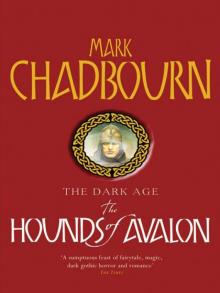 The Hounds of Avalon tda-3
The Hounds of Avalon tda-3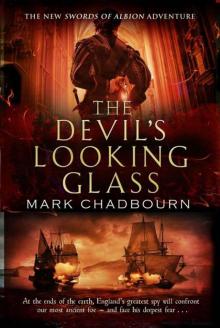 The Devil's Looking-Glass soa-3
The Devil's Looking-Glass soa-3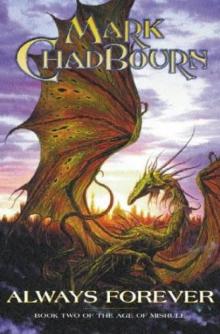 Always Forever taom-3
Always Forever taom-3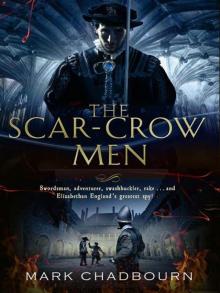 The Scar-Crow Men
The Scar-Crow Men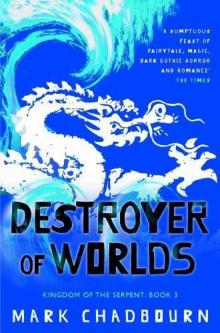 Destroyer of Worlds kots-3
Destroyer of Worlds kots-3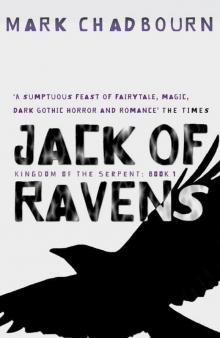 Jack of Ravens kots-1
Jack of Ravens kots-1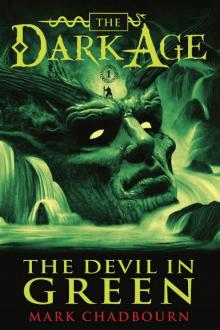 The Devil in Green
The Devil in Green World's End
World's End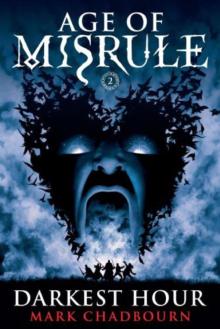 Darkest Hour (Age of Misrule, Book 2)
Darkest Hour (Age of Misrule, Book 2) Destroyer of Worlds
Destroyer of Worlds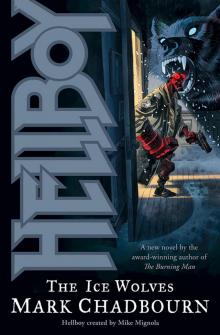 The Ice Wolves
The Ice Wolves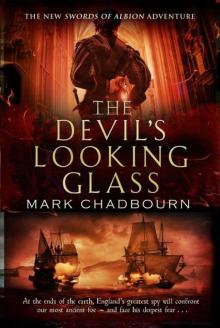 The Devil soa-3
The Devil soa-3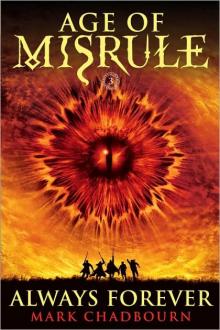 Always Forever
Always Forever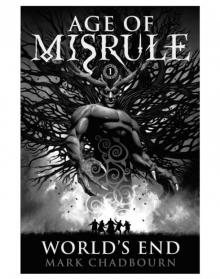 World's End (Age of Misrule, Book 1)
World's End (Age of Misrule, Book 1)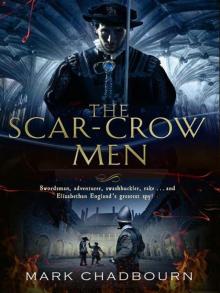 The Scar-Crow Men soa-2
The Scar-Crow Men soa-2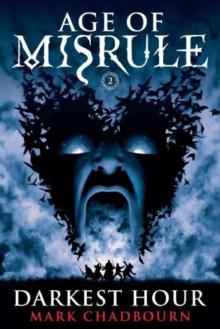 Darkest hour aom-2
Darkest hour aom-2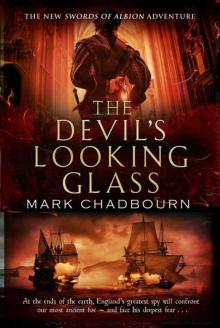 The Devil's Looking-Glass
The Devil's Looking-Glass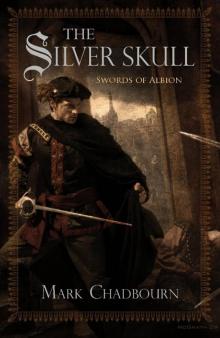 The Silver Skull
The Silver Skull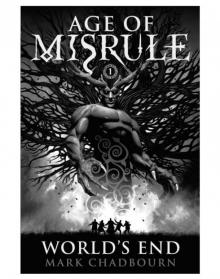 World's end taom-1
World's end taom-1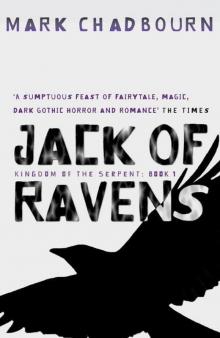 Jack of Ravens
Jack of Ravens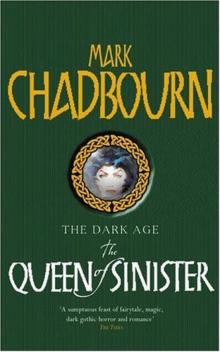 The Queen of Sinister
The Queen of Sinister